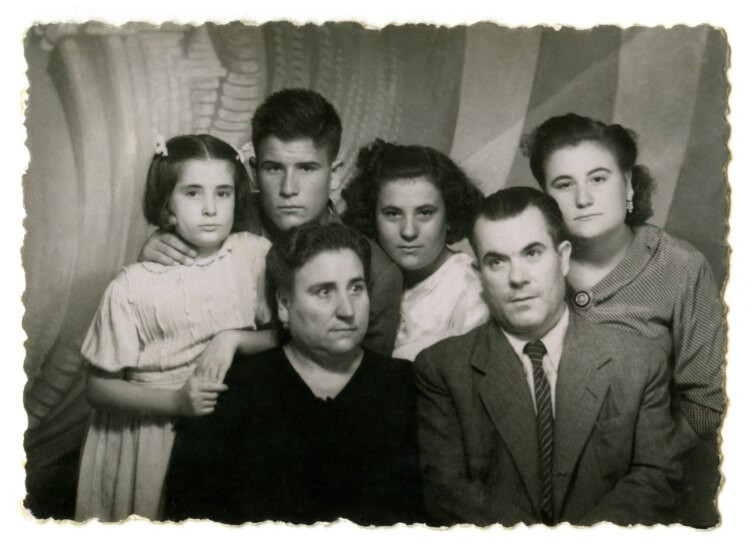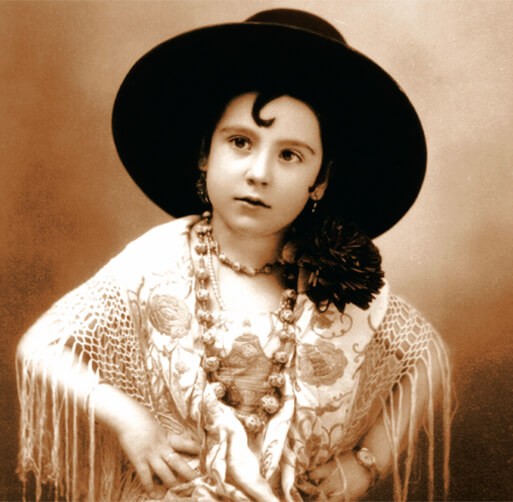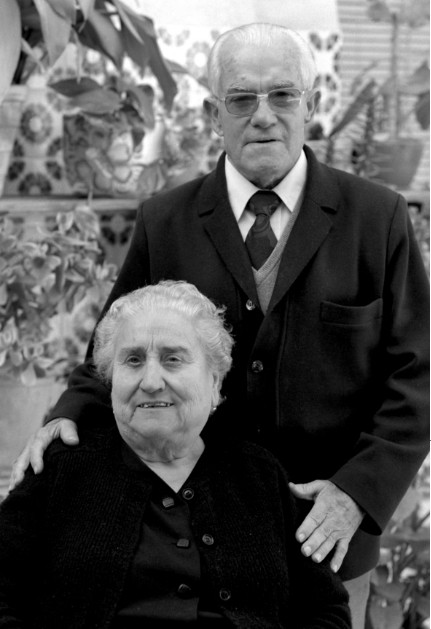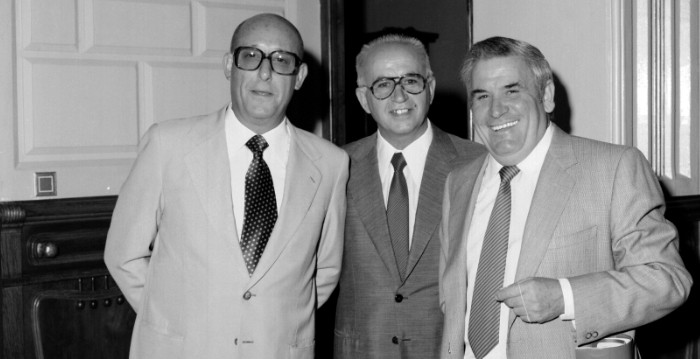
Jesús Navarro, company founder, with his wife Carmen Valero and their four children. From left to right: Conchita, Jesús, Magdalena, and Carmencita

Little Carmencita dressed as an Andalusian in the photo that generated the image for the recently created
company


Above, Jesús Navarro,
company founder,
with his wife Carmen Valero
and their four children. From left
to right: Conchita, Jesús,
Magdalena, and Carmencita
Left, little
Carmencita dressed
as an Andalusian in the photo
that produced the image for
the recently created company

Below on the right, Luis Navarro, Francisco Escolano and Jesús Navarro Valero, who positioned the brand as the undisputed market leader

Above, Jesús Navarro on a journey to the Canary Islands to expand markets

Jesús Navarro Jover learned to read as a teenager, when he understood that it was the only way to escape from poverty. The son of peasants, in a family with six siblings, he soon became inured to the hope that this month’s harvest would be better than the last one. And that, in a town without any natural wealth, where the landscape is more like Arizona and the river that waters it is salty, was too much to hope for. But he began to work as a child, first collecting manure from the streets to sell and take home some money; later in an esparto grass shoe factory. He made so many that it became the family’s main income. Between shoes, he always dreamed of working for himself, being his own boss. Years later, so that no child would be left without an education, he gave away several parcels of land on the only condition that they be used for public schools. Today the Jesús Navarro elementary school and the Carmen Valero nursery school continue honouring his memory.
In those times, in his native Novelda spices were traded, above all, saffron, that was brought from La Mancha and later exported to Asia and Africa. This business spirit was born of the need of a people without natural resources. Jesús’s goal was to do what others were already doing, but better and, above all, differently. He always believed in that. Writing two key words on the brand’s soul: difference and leadership.
The final impulse was written by the person who would be his wife and companion, Carmen Valero, daughter of the blacksmiths who made the wagons and bars for the houses in the town. Carmen gave Jesús the serenity, calm and, also, the hands to make the first paper sachets that he later sold door to door in nearby towns and as far away as Murcia, which at that time was like another world.

Right away, fruit of that tenacity, the business began to grow and more hands were needed. His wife was joined by her sisters and three or four neighbours, quick hands, able to transform a kilo of saffron into ten thousand paper packets, the exact measure for one of those family stews where up to the last drop in the pot was soaked up with bread. The saffron came from La Mancha in horse-drawn carts.
As the sachets at the beginning were white, without a brand, Jesús thought they should be stand out somehow, so he chose his first daughter’s name and took a photo of her with a bow. It was 1923. But another business in the area had a similar symbol. To be different, in an unconscious show of marketing ingenuity, he took the bow off her, placed on a Cordoban hat, dressed her as an Andalusian and put a Manilla shawl on her with a carnation. Thus was born the Carmencita we still know nowadays.
Around 1934 the women on the porch already numbered more than thirty and even in war times this number doubled. And after the cruel post-war period, the doors of the family home were always open to helping the neighbours with whatever they needed.
Shortly thereafter, when he ventured to the Canary Islands, Jesús was forging the current success of the brand thanks to the large consumption of spices in traditional Island dishes, starting, without knowing it, the internationalisation of the brand. “Carmencitas” travelled in the meagre cardboard suitcases of the Canary emigrants who went to Venezuela, in an effort to not lose the aroma, flavour and mother-love they left behind on the island. In some way, Carmencita was the umbilical cord. The American continent was and is, even today, the main market.
Nevertheless, the volume of sales never caused the hardships of the beginnings to be forgotten. Every morning Carmen and her daughter Carmencita prepared café con leche and cupcakes for the workers, who saw in the smile of that girl with the Cordoban hat the courage of parents who started on the hard road to prosperity with drive and effort. When, from 1955, the machines that sped up the packaging process were introduced, it is decided not to fire anyone and so diversification was sought: other spices and new packages.
The next generation, with Luis Navarro, Fracisco Escolano and Jesús Navarro Valero, strengthened and built on the values of the founder: tradition and, at the same time, modernity, a vision of the future and the spirit of leadership. With great effort they situated the brand as the undisputed leader in the market.
Today the third generation is the one preparing for Carmencita to celebrate 100 years. Under construction, a new factory that will be the most modern in Europe. Of course, located in Novelda, the town that always gets up, a town of men and women who fight, where the dream of our grandparents becomes reality. The emotion of seeing the arrival of that fabled year closer every day makes it ever greater every time, the excitement surrounds everything we do in this magical stage, precursor of great accomplishments. But it is only another stage, the baton continues on its journey
Carmen and Jesús, and their example of struggle and solidarity with society, continue through the years unstoppable, eternal.
Carmencita, one hundred years giving flavour and colour to your life. Goal met.
Carmen and Jesús, and their example of struggle and solidarity with society have continued over time to be unstoppable, eternal
Jesús Navarro Jover learned to read as a teenager, when he understood that it was the only way to escape from poverty. The son of peasants, in a family with six siblings, he soon became inured to the hope that this month’s harvest would be better than the last one. And that, in a town without any natural wealth, where the landscape is more like Arizona and the river that waters it is salty, was too much to hope for. But he began to work as a child, first collecting manure from the streets to sell and take home some money; later in an esparto grass shoe factory. He made so many that it became the family’s main income. Between shoes, he always dreamed of working for himself, being his own boss. Years later, so that no child would be left without an education, he gave away several parcels of land on the only condition that they be used for public schools. Today the Jesús Navarro elementary school and the Carmen Valero nursery school continue honouring his memory.

In those times, in his native Novelda spices were traded, above all, saffron, that was brought from La Mancha and later exported to Asia and Africa This business spirit was born of the need of a people without natural resources. Jesús’s goal was to do what others were already doing, but better and, above all, differently. He always believed in that. Writing two key words on the brand’s soul: difference and leadership.
The final impulse was written by the person who would be his wife and companion, Carmen Valero, daughter of the blacksmiths who made the wagons and bars for the houses in the town. Carmen gave Jesús the serenity, calm and, also, the hands to make the first paper sachets that he later sold door to door in nearby towns and as far away as Murcia, which at that time was like another world.


Above, Luis Navarro,
Francisco Escolano
and Jesús Navarro Valero
positioned the brand as the undisputed
market leader
Left, Jesús Navarro
on a journey to the Canary Islands
to expand markets
Right away, fruit of that tenacity, the business began to grow and more hands were needed. His wife was joined by her sisters and three or four neighbours, quick hands, able to transform a kilo of saffron into ten thousand paper packets, the exact measure for one of those family stews where up to the last drop in the pot was soaked up with bread. The saffron came from La Mancha in horse-drawn carts.
As the sachets at the beginning were white, without a brand, Jesús thought they should be stand out somehow, so he chose his first daughter’s name and took a photo of her with a bow. It was 1923. But another business in the area had a similar symbol. To be different, in an unconscious show of marketing ingenuity, he took the bow off her, placed on a Cordoban hat, dressed her as an Andalusian and put a Manilla shawl on her with a carnation. Thus was born the Carmencita we still know nowadays.
Around 1934 the women on the porch already numbered more than thirty and even in war times this number doubled. And after the cruel post-war period, the doors of the family home were always open to helping the neighbours with whatever they needed.
Shortly thereafter, when he ventured to the Canary Islands, Jesús was forging the current success of the brand thanks to the large consumption of spices in traditional Island dishes, starting, without knowing it, the internationalisation of the brand. “Carmencitas” travelled in the meagre cardboard suitcases of the Canary emigrants who went to Venezuela, in an effort to not lose the aroma, flavour and mother-love they left behind on the island. In some way, Carmencita was the umbilical cord. The American continent was and is, even today, the main market.
Nevertheless, the volume of sales never caused the hardships of the beginnings to be forgotten. Every morning Carmen and her daughter Carmencita prepared café con leche and cupcakes for the workers, who saw in the smile of that girl with the Cordoban hat the courage of parents who started on the hard road to prosperity with drive and effort. When, from 1955, the machines that sped up the packaging process were introduced, it is decided not to fire anyone and so diversification was sought: other spices and new packages.

Carmen and Jesús,
and their example of struggle
and solidarity with society
have continued over time
to be unstoppable, eternal
The next generation, with Luis Navarro, Fracisco Escolano and Jesús Navarro Valero, strengthened and built on the values of the founder: tradition and, at the same time, modernity, a vision of the future and the spirit of leadership. With great effort they situated the brand as the undisputed leader in the market.
Today the third generation is the one preparing for Carmencita to celebrate 100 years. Under construction, a new factory that will be the most modern in Europe. Of course, located in Novelda, the town that always gets up, a town of men and women who fight, where the dream of our grandparents becomes reality. The emotion of seeing the arrival of that fabled year closer every day makes it ever greater every time, the excitement surrounds everything we do in this magical stage, precursor of great accomplishments. But it is only another stage, the baton continues on its journey.
Carmen and Jesús, and their example of struggle and solidarity with society, continue through the years unstoppable, eternal.
Carmencita, one hundred years giving flavour and colour to your life. Goal met.